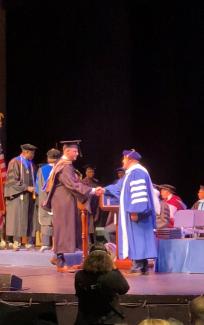
Enhanced Experience
By Preston Young
You go to high school, graduate, and have endless options as to what’s next. Some choose the military, some choose to go into a trade, some choose to take time to travel, some choose a 4-year university and while there are plenty of other options, there isn’t a “right” option. For me, it was a 4-year university. Then, I chose to continue my education and get my master’s degree. Which, I am now proud to call myself an official Master of Business Administration graduate.
Great! I went to school to what accumulates to be over 18 years and now have 3 letters after my name, a diploma, and a mind full of knowledge. Well, how much of this knowledge came from school? How much of it came from things I have learned on TV, books, the world, past experiences, conversations with colleagues, and most importantly, jobs. A common misconception I faced and think many other high school students face is that college will teach you everything you will need to know in order to be successful in the real world. While part of this holds true, the majority of it, does not.
When you begin your college career, you are thrown into what they call “Prerequisites”. Prerequisites are courses or conditions that must be completed to enroll in a future course. Most of these include simple math, business, language, science, and other courses. Basically, what you learn in high school just on a higher level. Then by year 2 and sometimes 3, you start to take courses based on your chosen major. These courses should be fun because you should enjoy learning about what you chose to learn more about. But the information you learn in these courses is base level. In my case, which was a finance major, I started to learn about what a stock and bond was, how the stock market worked, basic economics and much more.
Then in year 3 and 4, you start applying those simple terms and concepts to a larger degree whether that be math problems, research papers, etc. My point being, you’re not learning real world issues or applying your knowledge to real world situations. Many universities don’t even require an internship and the ones that do, won’t count your internship as credit. An issue many of my college classmates and friends are running into after they graduate is that entry level jobs are requiring 3-5 years of experience. The expectation that you must start with experience is extremely discouraging for recent graduates and professionals. Lucky for me, I didn’t run into this problem.
While college will teach you the basic concepts, what I have learned in my 11 months working with Tom and Paul is unmatched. While I am sure this is the case for many college graduates in their first “real” position, they are not as lucky as I am. Simply put, having 2, what I consider to be mentors and also friends, with you every day in an office where I am not just tasked with busy work but given the opportunity to sit in on meetings and do the same exact things they are doing is why I consider myself lucky and also fortunate. A huge part of my increased knowledge in the world of finance, financial planning, and wealth management is because of the team here at US Wealth New Haven. To take a recent college graduate and teach him a multitude of different topics, situations and real-world problems is a huge undertaking. To tie this all together, I have learned more in my 11 months working with Tom and Paul than I did in my 6 years of college. This is not necessarily a knock on the level of education I received in college, but a huge kudos to them. For the time, the patience, the willingness to teach, and most importantly, the opportunity they have given me.
Tracking: 1-05286543

